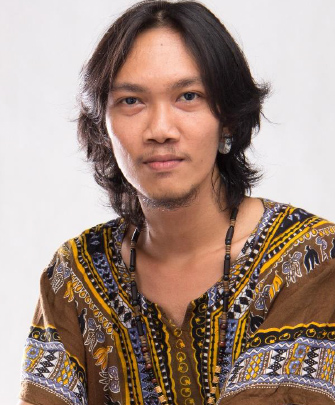Muhammad Yusuf Awwaludin Rozzaq

One evening towards the evening, my friend and I visited the house of one of the lecturers who was recovering from surgery. After a long dialogue about the dynamics of the lecture, he asked me "Zaq, do you still paint a lot?" Then I replied in surprise, "still, the day before yesterday I bought some cloth and canvas." Then He responded to my answer with a question, "Are you still painting abstract? Why don't you paint something else like surrealism or expressionism? " Then I replied with a little frown, "no, I like abstracts and I feel less interested in semiotic forms". After answering questions from him, I also had a dialogue with myself with a variety of questions that often arise in my head. The impressive question at that time was, if art was pure, why did he ask about a deterministic school that it was compulsory for me to choose these schools and then present them in my painting, wasn't it that gave an assessment of a painting, namely an observer or researcher. and not the artist, even though the artist has the freedom and authority to give an assessment of his work.
Artists in the Renaissance era might not have realized what type of flow in the paintings he created at that time. Therefore, there is an observer who observes the painting with complete awareness and contemplates the work in a deep way which is then examined for analysis through their expertise, either from a philosophical or psychological perspective. So that an impression is present within him — there is connectivity in the space and dimensions between the subjectivity of the observer and the artist's work. Is it possible that such is the process by which paintings or other works of art at that time receive an assessment of a sect and are then archived and become a history? If humans at that time could present such a type, categorization, flow, etc., then why could I as a human being still alive in this post-modern era not be able to create anything new? Maybe the word "no" is too conservative, but I have an idealismpositivistic paradigm, that I can make it happen at the right moment. They are nothing more than a form of propagation of an "if-then" causative verb and almost equivalent to the concept of causality itself. We need to know about a limit, a limitation, a limit, and a limit. We have a mind — a wise mind as well as a rational mind and what causes a conflict is nothing but a reflection of the reality of a boundary which we are not aware of. These matters are inherently very balanced in the pattern of life in human life for a peaceful life for the sake of humanity, universality, and divinity. Is that wrong? I think nothing less is like that. I am quite skeptical of a history — whatever it is that then has a considerable influence on certain judgments of that kind.
I act like that because I believe that knowledge based on "according to a person" occurs because he undergoes a process of reductions and interpretations of what he sees in real terms and becomes concrete knowledge. However, if we reduce from knowledge based on "someone according to", then we say without having an empirical that is coherent with that, could it be a concrete knowledge? Therefore, the effort I implement is based on that belief and it is good for us to love something around us, what is in front of us — actually what we see with our eyes is a reflection of our mind and mind. That is what is real and what cannot be denied, and be wise in what is: I love and I am.
However, after learning more about art, I feel that art has many perspectives and complexities in it. Perspectives about objects, humans, the universe, to divinity are the result
of art itself. I am not saying that everything is art. But everything in this world is art, which means that the boundaries of art are no longer an issue. But these boundaries are related to the complexity of art. The meaning of this complexity is the art of playing with fragile and vulnerable human souls into a beauty that can be shared.
Art for art, in my mind is art as a medium to receive all experiences of human life. Expressing authentic and honest human life experiences to become a beauty. Become a form of beauty that comes from the purity of the soul and human existence.
M. Y. A. Rozzaq (Ozaques)

